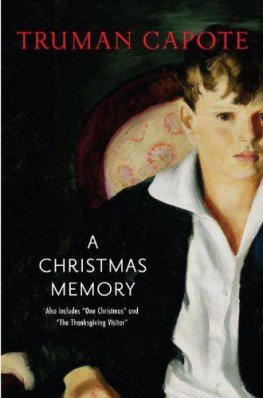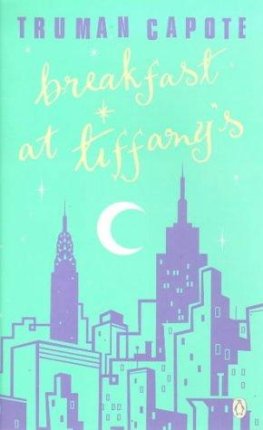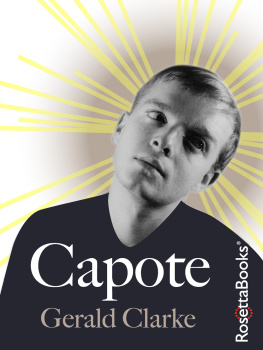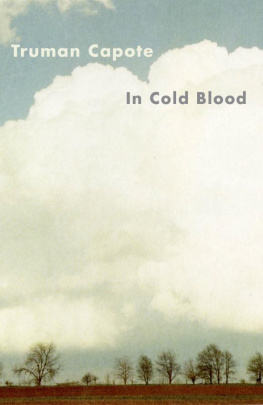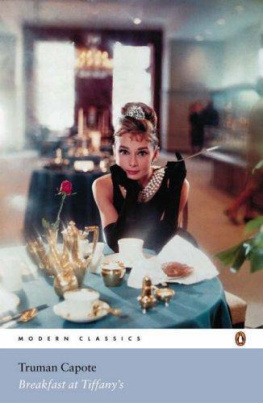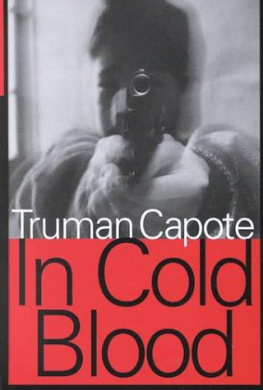Tison Pugh - Truman Capote
Here you can read online Tison Pugh - Truman Capote full text of the book (entire story) in english for free. Download pdf and epub, get meaning, cover and reviews about this ebook. year: 2014, publisher: University of Georgia Press, genre: Detective and thriller. Description of the work, (preface) as well as reviews are available. Best literature library LitArk.com created for fans of good reading and offers a wide selection of genres:
Romance novel
Science fiction
Adventure
Detective
Science
History
Home and family
Prose
Art
Politics
Computer
Non-fiction
Religion
Business
Children
Humor
Choose a favorite category and find really read worthwhile books. Enjoy immersion in the world of imagination, feel the emotions of the characters or learn something new for yourself, make an fascinating discovery.

- Book:Truman Capote
- Author:
- Publisher:University of Georgia Press
- Genre:
- Year:2014
- Rating:5 / 5
- Favourites:Add to favourites
- Your mark:
- 100
- 1
- 2
- 3
- 4
- 5
Truman Capote: summary, description and annotation
We offer to read an annotation, description, summary or preface (depends on what the author of the book "Truman Capote" wrote himself). If you haven't found the necessary information about the book — write in the comments, we will try to find it.
Truman Capote — read online for free the complete book (whole text) full work
Below is the text of the book, divided by pages. System saving the place of the last page read, allows you to conveniently read the book "Truman Capote" online for free, without having to search again every time where you left off. Put a bookmark, and you can go to the page where you finished reading at any time.
Font size:
Interval:
Bookmark:
TRUMAN CAPOTE 

EDITED BY R. Barton Palmer and Matthew H. Bernstein
A Literary Life at the Movies  Tison Pugh
Tison Pugh

Material quoted from Truman Capotes unpublished screenplays included with kind permission of the Truman Capote Literary Trust, Alan U. Schwartz, trustee.
2014 by the University of Georgia Press
Athens, Georgia 30602
www.ugapress.org
All rights reserved
Designed by Erin Kirk New
Set in 10 on 14.5 Warnock Pro
Manufactured by Thomson-Shore
The paper in this book meets the guidelines for permanence and durability of the Committee on Production Guidelines for Book Longevity of the Council on Library Resources.
Most University of Georgia Press titles are available from popular e-book vendors.
Printed in the United States of America
18 17 16 15 14 P 5 4 3 2 1
Library of Congress Cataloging-in-Publication Data
Pugh, Tison.
Truman Capote : a literary life at the movies / Tison Pugh.
pages cm.(The south on screen)
Includes bibliographical references and index.
ISBN 978-0-8203-4668-7 (hardcover : alk. paper)
ISBN 0-8203-4668-3 (hardcover : alk. paper)
ISBN 978-0-8203-4669-4 (pbk. : alk. paper)
ISBN 0-8203-4669-1 (pbk. : alk. paper)
1. Capote, Truman, 19241984Criticism and interpretation. 2. Capote, Truman, 19241984Film adaptations. I. Title.
PS3505.a59z835 2014
813.54dc23 2013037744
ISBN for digital edition: 978-0-8203-4709-7
British Library Cataloging-in-Publication Data available
To David Dean
Truman Capote: A Literary Life at the Movies was born, like Capote himself, in Louisiana but, unlike Capote, in a high school classroom in Baton Rouge. I am indebted to my teacher, Mitch Billings, for his magnanimity of vision in assigning a yearlong series of reports on Capotes literature. The writing of this book was funded in part by the University of Central Floridas College of Arts and Humanities, the Office of the Provost and Executive Vice President, and the Office of Research and Commercialization through the College of Arts and Humanities Research and Development Program. I deeply appreciate the support of Jos Fernndez, dean of UCFs College of Arts and Humanities, and Patrick Murphy, chair of the Department of English, and in particular the assistance of Nancy Stanlick, Kristin Wetherbee, Grace Nicholl, and Patricia Tierney. I would also like to thank Nicole Kristal, Shannon Salmon, Angela Jane Weisl, Bob Squillace, Nandini Sinha, Beth Techow, Jason Primm, Lilybeth Primm, and Annabelle Primm for their generous hospitality during research trips to Los Angeles and New York City, as well as Lisa Roney, for sharing food and good fellowship. Bruce Janz, director of the UCF Humanities and Digital Research Center, provided invaluable support and assistance. Warm welcomes were extended by the librarians and administrators of the Paley Media Center at both its Los Angeles and New York City branches, and in particular Richard Holbrook, senior librarian; the University of California, Los Angeles, Film and Television Archive, and in particular Mark Quigley, manager of the Research and Study Center; the Margaret Herrick Library of the Academy of Motion Picture Arts and Sciences; and the New York Public Library, Stephen A. Schwarzman Building. Finally, I thank Barton Palmer and Matthew Bernstein, editors of the series The South on Screen, as well as the editorial, production, and administrative teams at the University of Georgia Press, including Walter Biggins, Jon Davies, Beth Snead, and Lisa Bayer, who supported this project throughout its development. Material from Truman Capotes unpublished screenplays is quoted with kind permission of the Truman Capote Literary Trust, Alan U. Schwartz, trustee.
To minimize the documentary apparatus of this book, the following abbreviations of Capotes works are used for in-text citations. Also, each chapters endnote citations are condensed; for complete documentation, consult the Works Cited section.
AP | Answered Prayers: The Unfinished Novel |
BT | Breakfast at Tiffanys, and Three Stories |
CB | In Cold Blood: A True Account of a Multiple Murder and Its Consequences |
CS | The Complete Stories of Truman Capote |
DB | The Dogs Bark: Public People and Private Places |
GH | The Grass Harp, and A Tree of Night and Other Stories |
LC | Local Color |
MC | Music for Chameleons |
O | Observations |
OV | Other Voices, Other Rooms |
PO | Portraits and Observations: The Essays of Truman Capote |
SC | Summer Crossing |
T | Trilogy: An Experiment in Multimedia |
TRUMAN CAPOTE 
Capote and the Cinema
 An Overview
An OverviewTruman Capote once remarked, My primary thing is that Im a prose writer. I dont think film is the greatest living thing. In privileging his professional and artistic identity as an author of literary fiction, Capote diminishes the role of the cinema in his career, yet the truth of the matter is far more complex than a simple preference for his pen over film. For Capote truly lived in and through the movies. He avidly watched films throughout his life, publicly commenting on their merits and shortcomings, and the characters of his short stories and novels often see themselves and their dreams through a Hollywood lens. He wrote several screenplays, most notably Indiscretion of an American Wife (dir. Vittorio De Sica, 1953), Beat the Devil (dir. John Huston, 1953), and The Innocents (dir. Jack Clayton, 1961). Adaptations of his fiction, including Blake Edwardss beloved Breakfast at Tiffanys (1961) and Richard Brookss riveting In Cold Blood (1967) among numerous others, brought him wider fame and greater acclaim among readers. Additionally, he counted many Hollywood celebrities, producers, and directors as close friends, including Marilyn Monroe, David Selznick, Charlie Chaplin, Humphrey Bogart, and John Huston. Capote may have seen himself primarily as a fiction writer, but he lived his life as a celebrity, blurring the border between these ostensibly separate spheres of his career.
Never shy to express his opinions, Capote shared with friends his assessments of movies, and these miniature reviews evince his keen critical eye. He adjured John Malcolm Brinnin to let me warn you not to miss
Next pageFont size:
Interval:
Bookmark:
Similar books «Truman Capote»
Look at similar books to Truman Capote. We have selected literature similar in name and meaning in the hope of providing readers with more options to find new, interesting, not yet read works.
Discussion, reviews of the book Truman Capote and just readers' own opinions. Leave your comments, write what you think about the work, its meaning or the main characters. Specify what exactly you liked and what you didn't like, and why you think so.

